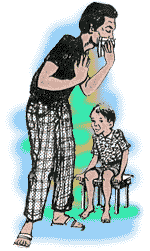 Nursing Diagnosis for Tuberculosis : Risk for Infection related to inadequate primary defenses, decreased ciliary function / static discharge, malnutrition, environmental contamination, lack of information about the bacterial infection.
Nursing Diagnosis for Tuberculosis : Risk for Infection related to inadequate primary defenses, decreased ciliary function / static discharge, malnutrition, environmental contamination, lack of information about the bacterial infection.Expected outcomes are:
- Identify interventions to prevent / reduce the risk of spreading infection.
- Show / lifestyle changes to promote a safe environment.
1. Review of pathology of the disease phase (active / inactive) the spread of infection, through the bronchi of the surrounding tissues or the bloodstream or lymph system and the risk of infection through coughing, sneezing, spitting, laughing, kissing, or singing.
Rational: Helping the patient to want to understand and accept the therapy given to prevent complications.
2. Identification of persons at risk for infections such as family members, friends, people in one assembly.
Rational: People who are at risk to drug treatment programs to prevent the spread of infection.
3. Instruct the patient to close mouth and remove phlegm in an enclosed shelter if the cough.
Rational: This habit is to prevent transmission of infection.
4. Use a mask every action.
Rational: Reduce the risk of spreading infection.
5. Monitor the temperature.
Rational: febrile, an indication of infection.
6. Identification of individuals at high risk for pulmonary tuberculosis re-infection, such as: alcoholism, malnutrition, intestinal bypass surgery, using immune-suppressing drugs / corticosteroids, presence of diabetes mellitus, cancer.
Rationale: Knowledge of these factors help the patient to change lifestyle and avoiding / reducing conditions worse.
7. Emphasize not to discontinue therapy undertaken.
Rational: contagious period can occur only 2-3 days after onset of chemotherapy if it happens cavity, the risk, the spread of infection can continue for 3 months.
Collaboration:
8. Monitor sputum smear
Rational: To monitor the effectiveness of drugs and their effects as well as patient response to therapy.